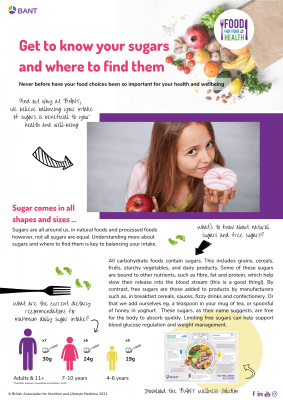
17 May 2023 BANT welcomes the new WHO guidelines warning against the use of non-sugar sweeteners (NNS).
Recognition that non-sugar sweeteners are not healthy.
BANT welcomes the new guidelines published 15th May by the World Health Organisation (WHO) (1) in which they recommend against the use of non-sugar sweeteners (NSS), also commonly referred to as non-nutritive sweeteners (artificial sweeteners and alternatives that contain zero or very low amounts of carbohydrates or energy).

A 2022 article published by BANT, The truth about sugars and non-nutritive sweeteners, detailed the misconception that non-nutritive sweeteners are a ‘healthier’ alternative to sugar when they are in fact associated with the risk of T2D, CVDs, and all-cause mortality (2). BANT is pleased to see the WHO findings reflect the same science and conclude that NSS do not confer any long-term benefit in reducing body fat in adults or children and may lead to an increased risk of type 2 diabetes mellitus (T2DM), cardiovascular diseases, and mortality in adults.
BANT Director, Isabel Hemmings, who supports nutritional interventions for prevention and management of Type 2 Diabetes says “these guidelines are very welcome at a time when diet-induced disease continues to rise and the number of people living with diabetes has recently surpassed 5 million for the first time” (3). The guidance on NSS’s has not been clear. Consumers have been misled, believing them to be healthy, and unaware that they may be worsening their condition and be detrimental to their overall health”.
BANT maintains its position that NSS consumption is compounded by multiple factors which include a) lack of regulation of NSS in ultra-processed foods b) labelling loopholes which allow manufacturers to pass NNS as healthy alternatives to sugar and/or substitute sugars with other ingredients masquerading as sugars such as modified starches (typically made using corn, wheat, or potato) and c) different and inconsistent definitions of what constitutes added and free sugars, for example, the WHO definition differs to the free sugar definition used by the Scientific Advisory Committee on Nutrition’s (SACN) in the UK. BANT has previously submitted concerns about SACN’s highly selective criteria regarding T2DM and low carbohydrate diets – where sugar is a central consideration.
Current SACN guidelines recommend no more than x7 teaspoons of sugar daily for adults, equivalent to 30g, and less for teenagers and children (3,4) which differs to WHO sugar recommendations of max. 5 to 10 teaspoons of free sugar per day or less than 10% of daily energy intake (5). Adherence to these Public Health recommendations, depending on which guidelines you follow, are low between 3% and 15% to SACN guidelines and 25% and 54% to WHO guidelines (6). BANT hopes these latest guidelines will help individuals make more informed decisions about NSS and recognise them as non-healthy alternatives to sugar.
BANT echoes the words of Francesco Branca, WHO Director for Nutrition and Food Safety. “NSS are not essential dietary factors and have no nutritional value. People should reduce the sweetness of the diet altogether, starting early in life, to improve their health.”
Download the BANT Sugar Guide Here

References:
- https://www.who.int/news/item/15-05-2023-who-advises-not-to-use-non-sugar-sweeteners-for-weight-control-in-newly-released-guideline
- Meng Y, Li S, Khan J, Dai Z, Li C, Hu X, Shen Q, Xue Y. Sugar- and Artificially Sweetened Beverages Consumption Linked to Type 2 Diabetes, Cardiovascular Diseases, and All-Cause Mortality: A Systematic Review and Dose-Response Meta-Analysis of Prospective Cohort Studies. Nutrients. 2021; 13(8):2636. https://doi.org/10.3390/nu13082636 Accessed 16/05/2023 at https://www.nutrition-evidence.com/article/34444794?term=34444794
- https://www.diabetes.org.uk/about_us/news/number-people-living-diabetes-uk-tops-5-million-first-time
- Scientific Advisory Committee on Nutrition (SACN) Carbohydrates and Health. Public Health England; London, UK: 2015. [Google Scholar]
- https://www.nhs.uk/live-well/eat-well/food-types/how-does-sugar-in-our-diet-affect-our-health/
- World Health Organisation (WHO) Guideline: Sugars Intake for Adults and Children. WHO; Geneva, Switzerland: 2015. [Google Scholar]
- Scientific Advisory Committee on Nutrition (SACN) Carbohydrates and Health. Public Health England; London, UK: 2015. Available online: https://www.gov.uk/government/statistics/ndns-results-from-years-7-and-8-combined
![]() Author: Claire Sambolino MSc, BANT Communications Manager & Registered Nutritional Therapy Practitioner rCNHC
Author: Claire Sambolino MSc, BANT Communications Manager & Registered Nutritional Therapy Practitioner rCNHC
FIND US ON POLITICS HOME
This article was published to Politics Home (PoliticsHome is an indispensable information source for the most influential people in UK politics – including Cabinet ministers, MPs, peers, senior civil servants and Westminster journalists)
View the BANT portal here: https://www.politicshome.com/members/profile/british-association-for-nutrition-and-lifestyle-medicine-bant
About BANT:
The British Association for Nutrition and Lifestyle Medicine (BANT) was founded in 1997 and acts as a professional body for Registered Nutritional Therapy Practitioners in one-to-one clinical practice and as a self-regulator for BANT Registered Nutritionists®, working in both clinical and non-clinical settings. BANT members combine a network approach to complex systems, incorporating the latest science from genetic, epigenetic, diet and nutrition research to inform individualised recommendations.
In 2022, BANT celebrated 25 years of leading the nutritional therapy profession, setting the standards of excellence in science-based nutrition and lifestyle medicine. BANT membership criteria is set at BSc (Hons) or above and those in 1-2-1 clinical practice must be registered with the Complementary and Natural Healthcare Council (CNHC) or be statutorily regulated. CNHC holds an Accredited Voluntary Register (AVR) for the Professional Standards Authority for Health and Social Care (PSA). A report by the Royal Society for Public Health and the Professional Standards Agency made a key recommendation that AVR practitioners have the authority to make direct NHS referrals, in appropriate cases, to ease the administrative burden on GP surgeries. BANT Nutrition Practitioners are the key workforce asset to harness 21st century lifestyle medicine to tackle the rising tide of stress-related fatigue, obesity, Type 2 Diabetes, dementia and other chronic diseases.
For over 25 years BANT has shaped the future of personalised nutrition and acts to represent the profession of nutritional therapy, with the hope of seeing greater recognition and integration of personalised nutrition and lifestyle medicine into primary care.
To find a BANT Nutrition Practitioner, please click here
BANT WELLBEING GUIDELINES:
The BANT Wellbeing Guidelines are specifically designed to provide clear, easy to understand general information for healthy diet and lifestyle when personalised advice is not available.
BANT launched its “Food for your Health” toolbox in February 2021 to provide open-access resources to help guide the public towards healthier food choices in prevention for diet-induced disease. Download a wide range of food and lifestyle guides, recipes, infographics, planning tools and fact sheets and start making healthy choices today.

